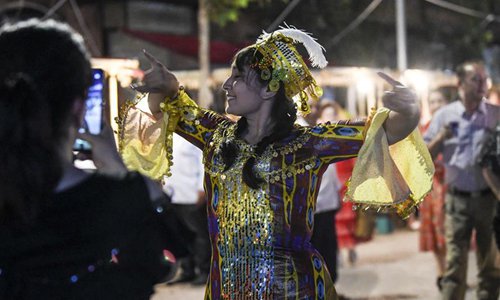
A girl dressed in ethnic costumes dances at a night fair in Kashgar, northwest China's Xinjiang Uygur Autonomous Region, Aug. 12, 2019. Photo:Xinhua
An English language documentary, Fighting Terrorism in Xinjiang, which was aired on China's state broadcaster CGTN on Thursday, unprecedentedly exposed the trauma that violent terrorism and religious extremism have brought about to the region. It has garnered extensive attention on overseas social media platforms. Some netizens from abroad commented that it uncovers the fact that Western media outlets are telling lies about Xinjiang and that Western journalists who have hyped Xinjiang issue by fabricating stories should carefully watch the documentary.
However, a strange phenomenon is that contrary to the heated discussion among netizens, no established Western media outlets have reported on the documentary so far. Western media and Western politicians who always scrutinize the Xinjiang issue have collectively gone silent. Is there anything that more aptly shows the hypocrisy and double standards of these media and politicians over the Xinjiang issue?
Western media and politicians have expressed particular "concerns" about Xinjiang recently. They fabricated an image of Xinjiang based on their imagination and used it to slander China.
The documentary tells of a Xinjiang different from what they imagined, citing indisputable factual material. This is probably why it has been snubbed by Western media. They have neither the courage nor the will to acknowledge they contrive stories about Xinjiang. They may never expect China, which used to keep a low profile over the Xinjiang issue, would have made such an English language documentary and are feeling lost about how to respond to it.
One certain thing is that when it comes to the Xinjiang issue, the Western media don't report about facts and instead report selectively. Their reports are ideologically driven, subjective, partial and don't care about facts. What they have done is an insult to media professionalism, having degraded themselves to "political thugs" against China.
It's noticeable that the documentary made public many rare video footage of terrorist attacks including the Urumqi riots on July 5, 2009, the Tiananmen Square terror attack on October 28, 2013 and the Kunming train station assault on March 1, 2014. Incomplete statistics show that from 1990 to 2016, thousands of violent terrorist attacks were launched in Xinjiang, killing large numbers of innocent people and hundreds of police officers. A total of 197 people died in the "7.5" Urumqi riots alone.
Those Westerners who point an accusing finger at the Xinjiang issue don't live in Xinjiang. The grim anti-terrorism situation there is merely a topic of discussion for them, but for more than 24 million Xinjiang people, it means a horrible threat to their life and property. It is reassuring that no terrorist attacks have occurred in Xinjiang over the past three years. This is a big victory for Xinjiang in the global war on terror and extremism. The region's counter-terrorism measures are appropriate.
Mainstream Western media refuse to recognize Xinjiang's achievements in combating terrorism. Instead, they are using their politicized human rights criteria to find fault with the region. They have become the accomplice of the terrorists and extremists.
We can't count on outsiders to report truth about China. We should tell our own stories. There are many touching and commendable stories concerning Xinjiang's anti-terrorism efforts. The documentary is a start, and we should produce more works of this kind in the future. The facts about Xinjiang are indisputable and Western propagandists can't shun them eventually.




